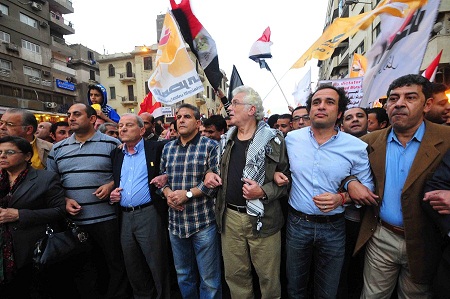CAIRO: Youth groups criticized the Supreme Council of the Armed Forces (SCAF) for not inviting them to a meeting with different political parties on Sunday.
Representatives from political parties met with SCAF to discuss the upcoming parliamentary elections, the PA and Shoura Council laws, the constitution and other issues related to the transitional period.
The April 6 Youth Movement said in a statement issued Sunday that SCAF refused to invite any youth groups to the meeting and sufficed with meeting recognized political parties.
General Coordinator of the Revolutionary Forces Alliance Haitham El-Shawaf said that this was an attempt by SCAF to manipulate and separate political parties from the youth groups.
"SCAF needed to do this especially after political powers agreed to escalate matters against it following a recent decision to activate emergency law clauses," he said.
He added that political powers are organizing mass protests on Sept. 30 against the emergency law and amendments to the new PA and Shoura Council laws.
In July, SCAF had approved a combination of closed party lists and individual candidates systems in the upcoming elections, with 50 percent allocated to each, a point widely criticized by political powers.
However, Mohamed Abbas, member of the Coalition of Youth of the Revolution, said that the separation of political parties from the youth groups by SCAF in its meetings is “nothing new.”
"I don’t believe it has any indication," he said.
Mohamed Adel, member of April 6 Youth Movement’s political bureau, said the movement met with political parties on Saturday evening to prepare for the parties’ meeting with SCAF, despite having not being invited.
They agreed to pressure SCAF to implement the treachery act and the closed party list in the upcoming parliamentary elections.
Adel added that the political powers agreed that they wouldn’t leave the meeting until the emergency law was cancelled.
The Coalition of the Youth of the Revolution also coordinated with political powers and agreed on the same demands before the meeting.
El-Shawaf said there was no coordination between his alliance and the political parties who attended the meeting with SCAF.
Mostafa El-Naggar, cofounder of El-Adl Party, criticized the emergency law and called for guaranteeing the integrity and transparency of the upcoming parliamentary elections, in addition to the implementation of the closed party list system during the meeting.
El-Naggar said on his Twitter account that parties affiliated with the ousted regime attended the meeting and expressed their approval to combine the individual candidates system with the closed party list.
"[The treachery act] guarantees integral parliamentary elections, away from remnants of the National Democratic Party (NDP), who used thuggery and terrorism to rig the elections," the statement read.
In July, Egypt’s Administrative Court decided to reactivate the treachery act, a post 1952 revolution law, to criminalize former regime officials in cases of political corruption.
In August, the Cabinet released the amended treachery act, stripping officials proven guilty of political corruption of their right to practice politics for five years.
The meeting was still in session until press time.


